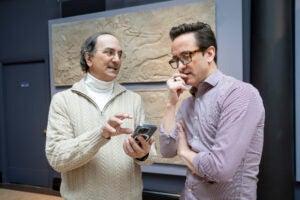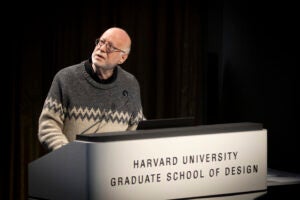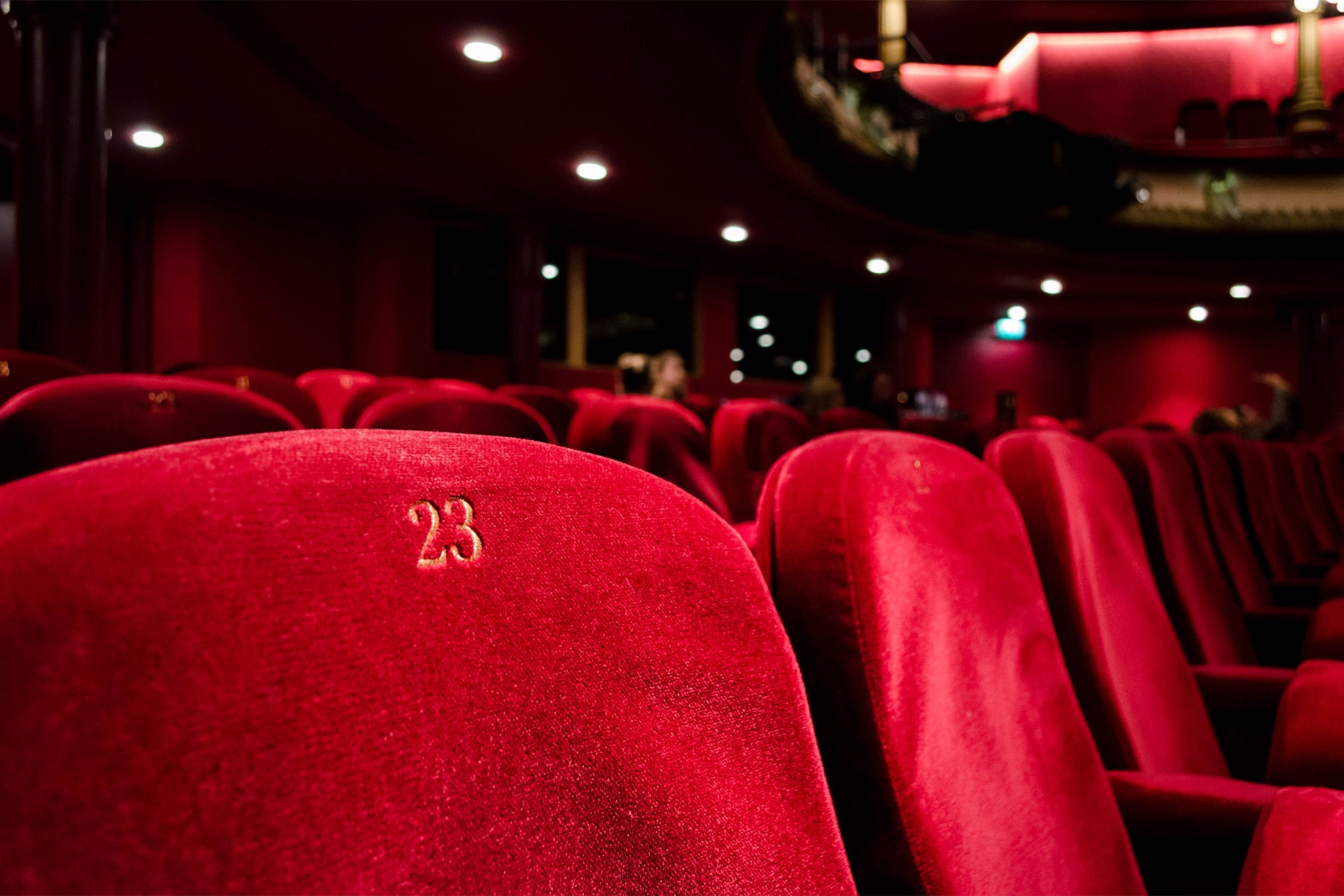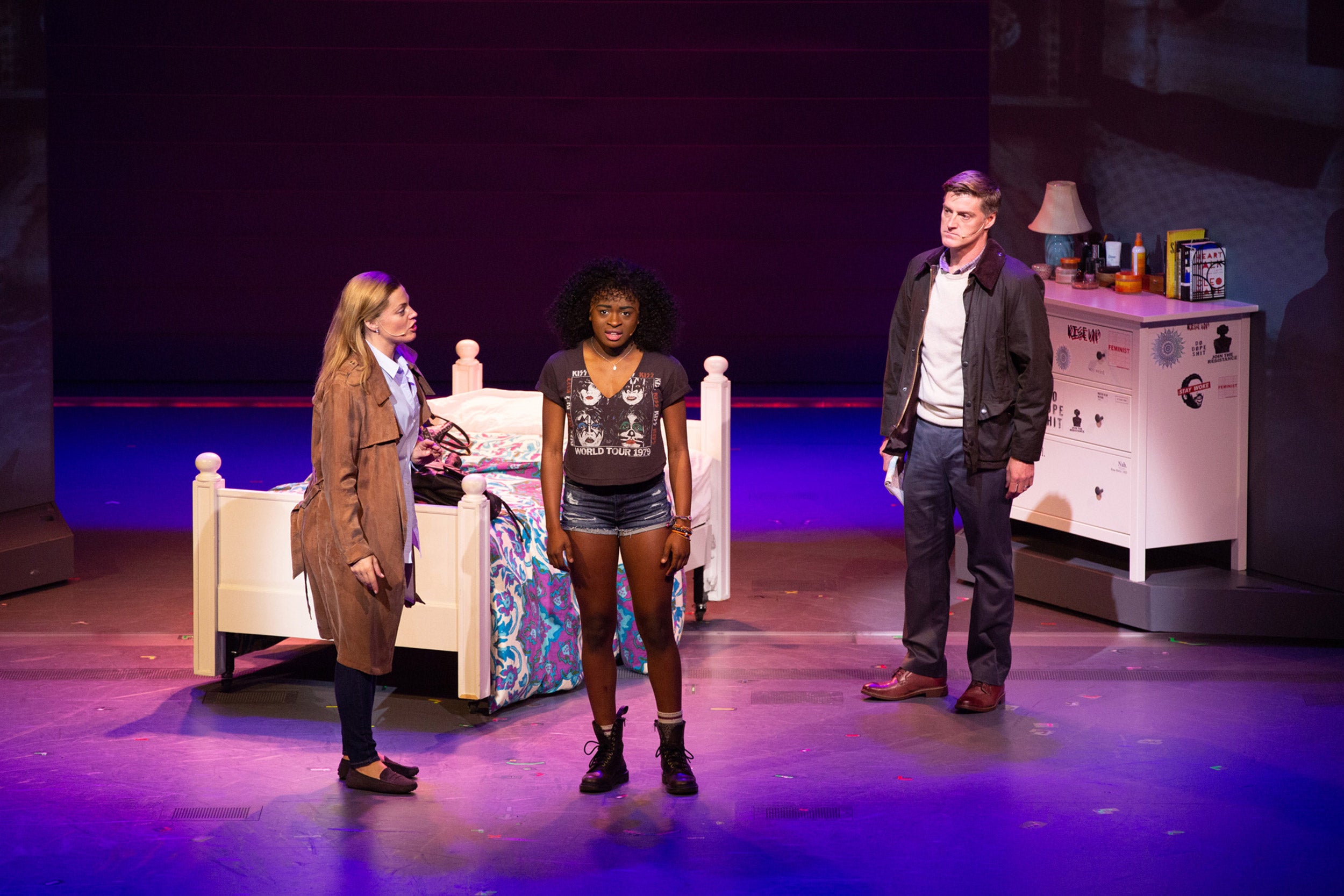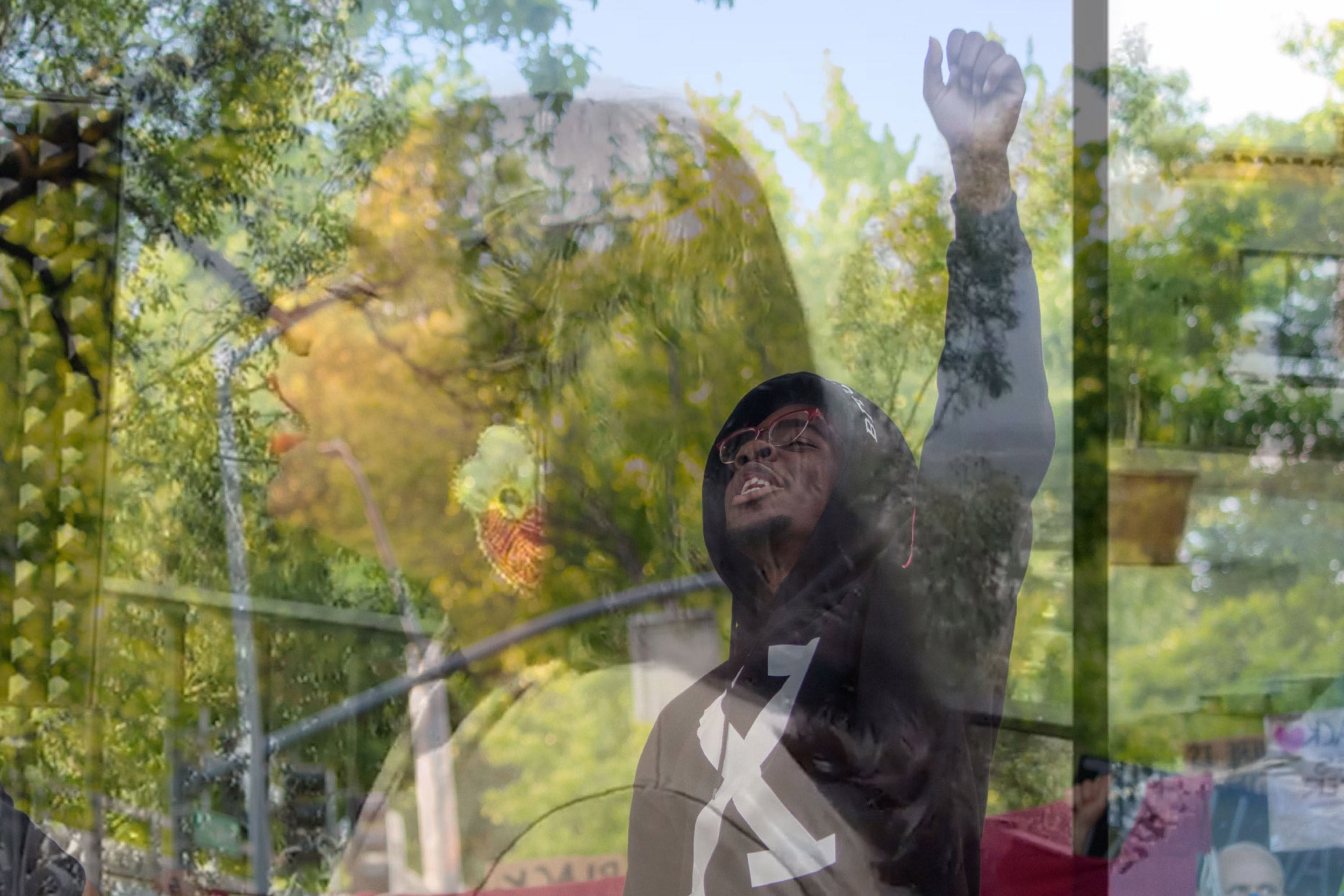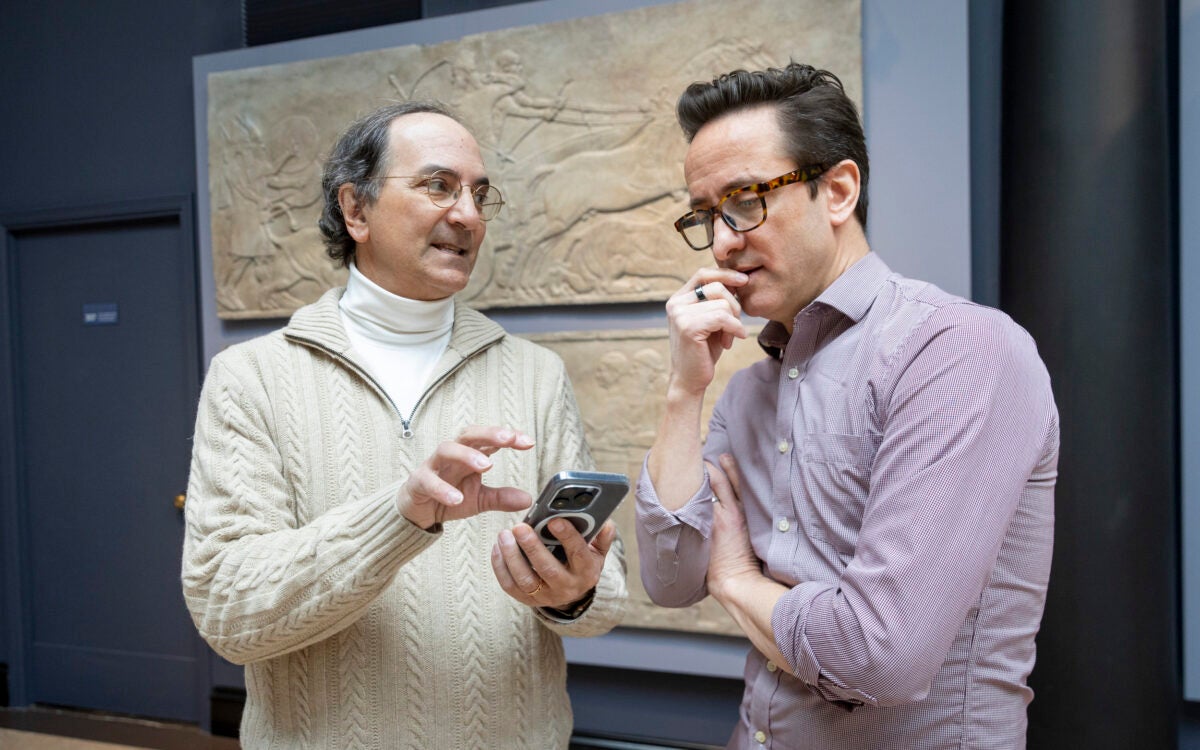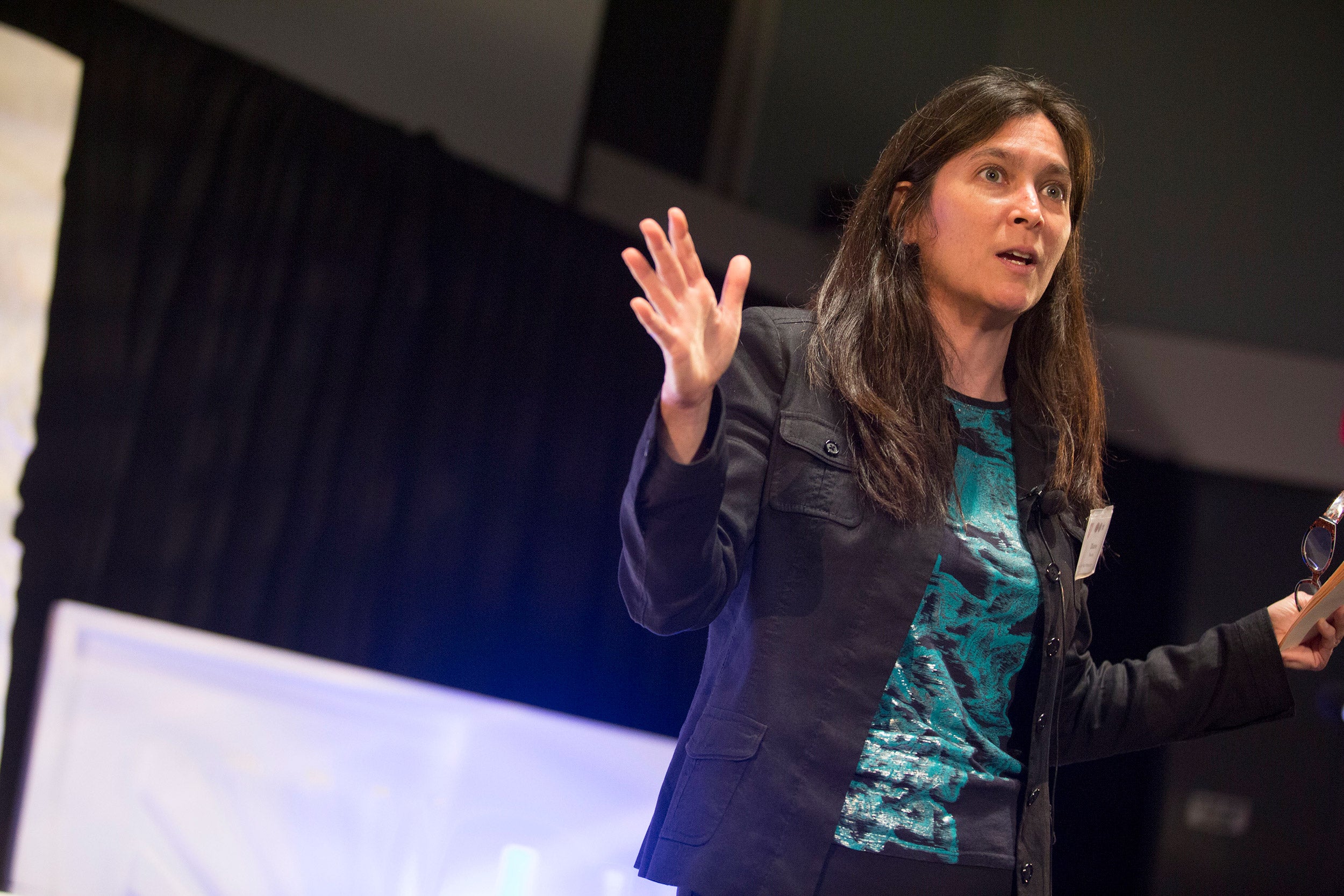
“ … there are ways in which innovation can happen, and theaters, including the A.R.T., are looking at how to do it …,” says Diane Paulus, the Terrie and Bradley Bloom Artistic Director.
Future of theater? Not exactly sure, but Diane Paulus is working on it
For now, A.R.T. has 15 new Tony nominations, robust lineup of virtual shows, talks
The American Repertory Theater (A.R.T.), which just received a near-record 15 Tony nominations for the musical “Jagged Little Pill,” is looking ahead even as its Loeb Drama Center home remains dark. Diane Paulus, the Terrie and Bradley Bloom Artistic Director, recently spoke to the Gazette about the Tony recognition, A.R.T.’s wide-ranging fall schedule, and the very survival of theater itself.
Q&A
Diane Paulus
GAZETTE: Congratulations on the Tony nominations! Only “Hamilton,” which had 16, got more.
PAULUS: Thank you. I think you’d have to factor in that this was an abbreviated season. What 15 nomination means to me is that there’s recognition of a breadth of contribution, which makes me the happiest of all, as the director. My colleagues, my team, the actors — that breadth of effort is recognized.
GAZETTE: It’s great recognition of what you have referred to as “the transformative potential of shared space and shared experience” — an experience that is currently on hold. What is the state of theater right now?
PAULUS: Theater is about collective presence, the shared space, and the transformational energy. That’s something we just can’t have right now. But there are ways in which innovation can happen, and theaters, including the A.R.T., are looking at how to do it — how to reach for that connection in a digital space. We have artists to support. We have audiences to stay engaged with. We have our survival as a sector. So institutions like the A.R.T., while we might not be delivering theater as we know it, we are doing what we can to support artists at this moment, to stay engaged with audiences.
GAZETTE: How do you do that when you can’t have live in-person performance?
PAULUS: What we have to look at is how do we maintain our creativity and artistry? How do we keep the pilot light going? An artist practices and trains and goes to class. And that’s how they keep their creativity going. It’s just working those muscles, participating in creative development.
“This is an opportunity for a larger, broader audience to have access to theater. You can see it on your telephone.”
GAZETTE: And live streaming, like the new Virtually Oberon series or the upcoming “Jack and the Beanstalk: A Musical Adventure.”
PAULUS: Yes, you’re not getting real live response, but, you know, playing your guitar and putting it out on the internet is a creative expression. Letting what’s inside out. There’s no replacing live performance, even with live streams, right? You can get as close to live with a live stream, but you still are not in the same space. But we all get it. We’re in a global pandemic; we understand why we need to follow these paths.
GAZETTE: Tell us about hosting local artists, like poet-rapper-educator Oompa, with your Virtually Oberon series.
PAULUS: We’ve seen so many artists broadcast from their kitchens and their living rooms. And we thought, we have this amazing venue. How can we, with all the health and safety protocols, open it and offer our space as a studio for artists? How can we partner with artists to amplify their work, give them production support, put them on a platform, and get them out through our institutional muscle?
GAZETTE: The fall season also features three free discussion series — Civically Speaking, Behind the Scenes, and the weekly Tuesday Lunch Room — which cover a range of topics from creativity to the A.R.T.’s ongoing commitment to cultural transformation.
PAULUS: This disruption has made us think about how else we can be an engine inside the University. Being able to create a series like Civically Speaking and inviting faculty to conversations around issues of history and politics and democracy, or when an artist like Claudia Rankine can be in conversation with Orlando Patterson, John Cowles Professor of Sociology, to talk about racial reckoning and whiteness in this moment [Thursday at 7 p.m.] … It’s not theater like you knew it, but what has always been exciting to the art is how do we catalyze conversations? How do we make space — albeit virtual — in this moment to be together in conversation? How do we find a deepening of compassion and empathy and learning? How do we do that with artists, thinkers, faculty at Harvard? We’re still flexing all those muscles.
GAZETTE: Are there any upsides to the current constraints?
PAULUS: One defining feature of live theater is the fact that we can only have a certain number of people, defined by our capacity in our auditorium or our studio or wherever we’re performing. But the virtual sphere is infinite in comparison. This is an opportunity for a larger, broader audience to have access to theater. You can see it on your telephone. You don’t have to be at the theater necessarily. And so that’s an opportunity. [A.R.T. is also offering pay-what-you-can options for ticketed events.]
GAZETTE: Are there other benefits to not staging shows in the traditional way?
PAULUS: We always do a family show every year. It usually takes place at the Loeb Drama Center in the winter holiday period. We’re pivoting because we realized, well, we don’t have to wait. We’re not bound by a calendar: When is the stage free so we can put on our family show in rep with another show? We can develop this and put it out earlier. We can record an album in advance and get that out. There’s creativity that is unleashed when you realize that there are certain constraints of the old model that you don’t have to follow.
GAZETTE: How else is the upcoming family show changing?
PAULUS: “Jack and the Beanstalk” is being written by two Harvard undergraduates [Julie Riew ’21 and Ian Chan ’22] as a 45-minute Zoom musical. Much of the engagement is planned around that kind of Zoom experience for kids — or, as we like to say, kids and their grownups, because on the other end of the Zoom there is a family sitting in the living room.
GAZETTE: Is moving into the virtual world pushing other creative boundaries?
PAULUS: We’re partnering on a new play with four theaters in December. There are coproductions all the time, but you’re going to see these more and more as a way to pool resources, creative teams, and budgets. And this is a project that was created by the playwrights specifically for this moment. This is not a play that is being put onto Zoom just because that’s how we have to do it. This is an artistic creation born to be delivered in this moment through the medium of the virtual space, marrying content and form.
GAZETTE: What else are you wrestling with going forward?
PAULUS: How are we pivoting to survive artistically, emotionally, spiritually, financially? How are we going to survive this moment? And what can we learn that might impact our work when we come back? Whenever that is.
The Office of the Vice Provost for Advances in Learning will host a joint conversation with Diane Paulus and Joe Allen, Roadmap for Recovery and Resilience, on Oct. 29.
Interview was lightly edited for clarity and length.

